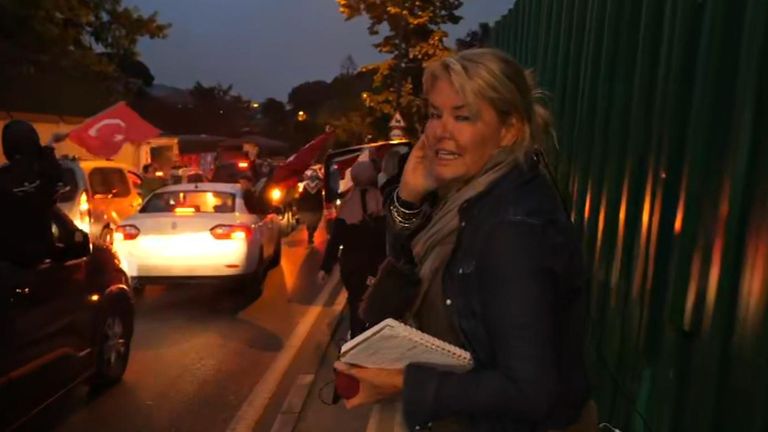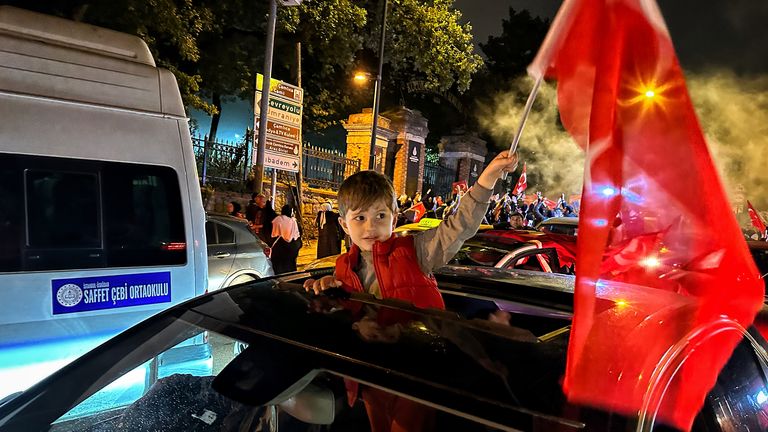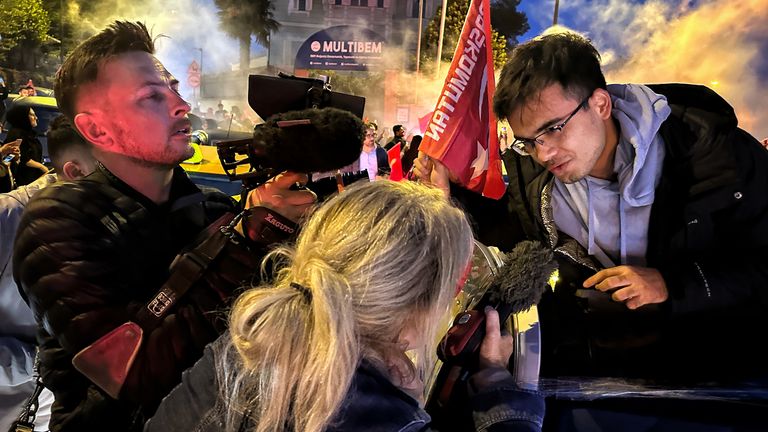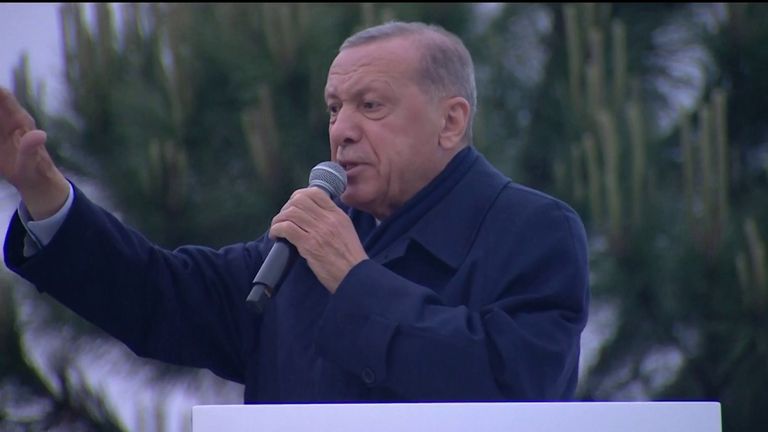The man who revels in his image as Turkey’s strongman took an early lead almost as soon as polls closed in the second round of voting for President.
Celebrations began long before the official declaration. But in truth, the dye was cast some time ago, before the election.
Recep Tayyip Erdogan‘s demeanour even before campaigning began for the unprecedented run-off has been one of a leader comfortably confident of securing his third decade in power in a country that holds a uniquely significant geographical position in the world.
Turkey election latest:
Erdogan thanks crowds as election officials declare him winner
From the time he voted in the first round to extend his time as president, he appeared supremely relaxed about his chances of winning.
This was despite the polls showing him trailing behind his challenger, the leader of a six-party alliance called Kemal Kilicdoroglu.
Mr Erdogan’s re-election comes in the teeth of a spiralling economy, rampant inflation and in the wake of a horrific natural disaster clouded by accusations his government was slow to respond.
“We are so happy,” one of his fans told us outside his Istanbul home. “Our economy is good….OK, it’s been bad for two years but we trust him and he will do his best.”
“Bye bye Kemal,” others told us. “Erdogan is our strong leader,” was the mantra repeated to us over and over again.
The people gathered waving flags, setting off fireworks and singing and dancing down the roads leading to his home in the Uskudar district of the city were predominantly religious conservatives, many of them women, mostly wearing hijabs and conservative Muslim clothing.
“We love Erdogan,” they told us.
Within an hour or so of polls closing, with just 55% of votes counted, the incumbent had already built a hefty lead, according to the state broadcaster TRT.
That very early lead never seemed likely to change.
Later counting narrowed the gap somewhat but the sitting president still managed to secure more than half of the votes cast with his rival trailing roughly four points behind. (Latest official figures at the time of writing show 52.1% to Mr Erdogan and 47.8% for Mr Kilicdaroglu.)
This was the closest President Erdogan had come to being unseated was how the opposition and most Western media framed the outcome of the first round.
But in reality, the odds were always heavily stacked against any electoral upset or success by his rival.
Mr Erdogan has spent his two decades at the helm consolidating his power – cracking down on dissent, intimidating and jailing opposition politicians and journalists and ensuring the Turkish media is mostly state-controlled and complaint.
International observers in the country who were monitoring the initial vote criticised Mr Erdogan’s use of state resources and his control of the media to unduly influence the electorate.
Once the dust has settled, they’re likely to voice the same concerns this time around.
In his concession speech, Mr Kilicdoruglu called it the “most unjust election campaign ever” referring to the heavily-biased coverage of the President’s campaign in most Turkish outlets rather than his.
When we managed to get close enough to question the sitting leader about whether he’d accept the outcome of the vote whatever the result (in the first round), we were sharply rebuked by him for questioning his approach and his ‘history’ over the past 20 years.
“That is a very bad question,” he told me.
“You don’t know me and how I’ve been over the past 20 years,” he scolded me as his security detail and political team rushed to move him on quickly.
His critics believe his next five years in office are likely to see him take the country further down the autocratic path he embarked on several years ago.
It’s a path made smoother after his AK Party gained 266 seats in the parliamentary elections, resulting in a commanding total of 321 including his coalition partners.
Read more:
Recep Tayyip Erdogan: Who is Turkey’s president?
Who is Kemal Kilicdaroglu – the man who wanted to end Erdogan’s reign?
If his campaigning over the past two weeks and his repeated criticism of how Western journalists have covered the elections are anything to go by, President Erdogan is likely to ratchet up his strained relationship with the foreign media and those nations critical of his leadership.
At one rally he told his supporters: “We are competing against those trying to disrupt the century of Turkey.
“Magazines have covers reading Erdogan must go. It’s none of your business. The West cannot decide it. It is up to my nation.”
Mr Erdogan’s influence during his years in power on international affairs like the Russia-Ukraine war and the European migration crisis has been crucial. And he has used his position skilfully.
A largely suspicious West has seen him manoeuvre himself into a pivotal global spot – able to talk to the leaders of both Russia and Ukraine as well as America and Iran – and building essential bridges with key economic powers like Saudi Arabia, as well as sending peacekeeping troops to countries like Somalia and Libya.
He has visited African countries more times than any other non-African leader during his time in office.
Analysis:
The West will be disappointed with Erdogan’s electoral success
As a member of NATO, he’s shown he can wield considerable clout for political gain as he’s demonstrated recently with the delayed but final acceptance of Finland into the club.
Turkey’s acquiescence only came after Finland agreed to take a harder line against Kurdish dissidents and the Kurdish PKK party.
Now on his home turf, he has once again proved the critics wrong and outmanoeuvred his toughest challengers and his grip on power seems unassailable.
This story originally appeared on Skynews






